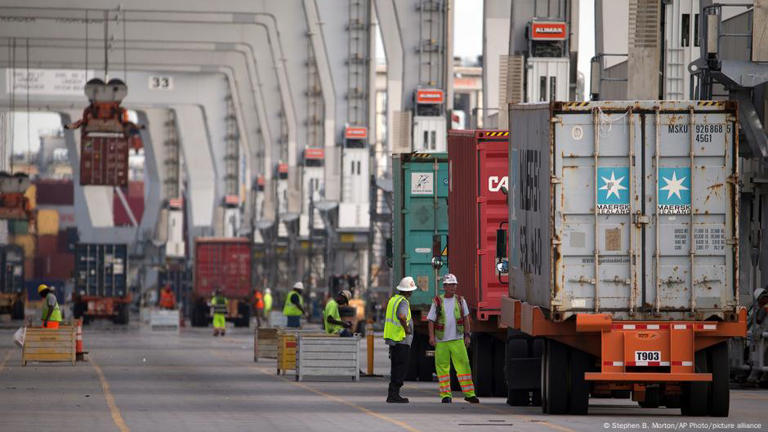Dockworkers at major ports along the US east coast have walked off the job after wage negotiations failed. The shutdowns could cost the economy billions of dollars a day and stoke inflation.
US dockworkers went on strike on Tuesday, halting the processing of consumer goods at major US ports along the Atlantic and Gulf of Mexico coasts.
The International Longshoremen’s Association (ILA) said the walkout marks the first “coast-wide strike in almost 50 years” for the organization.
Some 45,000 port workers were represented in the negotiations between the ILA and the United States Maritime Alliance (USMX) employer group for a new six-year contract ahead of the September 30 deadline.
“We are prepared to fight as long as necessary, to stay out on strike for whatever period of time it takes, to get the wages and protections against automation our ILA members deserve,” Harold Daggett, head of the 85,000-member union, said in a statement.
“USMX owns this strike now. They now must meet our demands for this strike to end,” Daggett said.
The strike is expected to affect a wide range of products, from food to automobile shipments, across dozens of ports. The disruption could cost the US economy billions of dollars a day, threaten jobs, and stoke inflation.
Seeking protections from automation
US media reported that the ILA is asking for a 77% wage increase over six years. So far, USMX has offered a 50% increase.
“USMX brought on this strike when they decided to hold firm to foreign-owned Ocean Carriers earning billion-dollar profits at United States ports, but not compensate the American ILA longshore workers who perform the labor that brings them their wealth,” Daggett said in reference to shipping giants like Danish Maerks and others who are on the opposite side of the negotiation table.
The union is also fighting to stop port automation projects that it says will result in job losses for its members.
Biden says he will not intervene
The strike comes just weeks ahead of the US presidential election, where the cost of consumer goods and the economy have been main topics for voters.
US President Joe Biden, who has defined himself as a close ally of organized labor, has so far ruled out federal intervention, citing the need to respect collective bargaining rights.
US Chamber of Commerce President Suzanne Clark urged Biden on Monday to reconsider his position, saying it “would be unconscionable to allow a contract dispute to inflict such a shock to our economy.”
But White House officials told Reuters on condition of anonymity they are hoping for a short strike.
New York Governor Kathy Hochul said officials there were prepared for the strike. “We don’t anticipate shortages of essential goods anytime soon,” she said, downplaying a potential crisis in the delivery of goods.
“People do not need to rush out to the grocery store and stockpile goods like they did during the pandemic,” Hochul added.
jcg/nm (Reuters, AFP)


 Business11 months ago
Business11 months ago
 Politics8 months ago
Politics8 months ago
 SportsNews11 months ago
SportsNews11 months ago
 Trending3 months ago
Trending3 months ago
 Politics11 months ago
Politics11 months ago
 Politics3 months ago
Politics3 months ago















